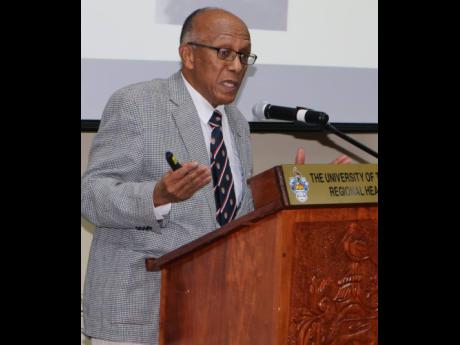Devon Dick | Listen to what Patterson has to say
Last year, Jamaica-born Orlando Patterson, Harvard professor and noted Caribbean intellectual, gave a lecture at the University of the West Indies, based on his recent book, The Confounding Island: Jamaica and the Postcolonial Predicament. Patterson is intrigued by the paradoxes of Jamaican life, such as Jamaica having persistent poverty, but still being one of the 11 happiest populations on earth.
There are possible explanations for happiness coexisting with ‘persistent poverty’. Peter Roberts, Caribbean linguist, in A Response to Enslavement: Playing their way to Virtue, argues that a response to slavery in Jamaica was powered by play, and visibly expressed in an image of happiness. In fact, the planter class claimed that the enslaved people in Jamaica were happy and posited that the evidence was their singing, dancing and carousing. However, the enslaved persons could be making merry in order to make the best out of a bad situation. They ‘tek kin teet kibba heart bun’, meaning that they were using laughter to cover their pain. So this happiness in Jamaica could be a means to endure this endemic poverty.
But Patterson’s lecture and book is more than about paradoxes of Jamaican life. He highlighted that Jamaica has a far greater global profile than its size commands. Reggae is globally influential.
HIGH PRAISE
Patterson also heaps high praise on the Maroons, claiming ‘with the mighty British Colonial army at one time forced to sue for peace before agreeing in a treaty to allow the rebels to form their own state within a state on the island with its own laws and rulers. There is no similar treaty by a slave holding class in the history of slavery, or for that matter in the history of empire’ (p 5). Patterson heaps scorn as he recounts the genocide in colonial Jamaica. ‘It is a past drenched in blood, like no other place on earth, marked by the swift genocide of the Tainos and the slow-motion genocide of the African’ (p 5.)
And when talking about independent Jamaica, he believes that building housing estates as a way of helping the urban poor is a ‘hopeless, wasteful and thoroughly iniquitous approach that resulted in the displacement of thousands. . .’ (p 15). His approach, as adviser to Michael Manley, former prime minister, was an upgraded programme that focused on improvements in sanitation, sewage clearance, water supply, infant day public health, home repairs and aid for the destitute, especially the elderly’ (p 15). In other words, he would not be an admirer of Arnett Gardens or Tivoli Gardens.
Patterson mentions the rash socialist rhetoric of the noisy left wing, the possible destabilisation by CIA, institutional incompetence of the civil service in the 1970s to be replaced in the 1980s by a bickering business community, weakening of farming community by indulging in an import binge of luxury goods. And most unfortunately, devaluation of the Jamaican dollar, inflation and draconian cuts in social spending. In this general election year, have the Jamaica Labour Party and People’s National Party learnt the lessons of the past?
The private sector was largely incompetent, except for the tourist industry (p 105.) Additionally ‘the catastrophic collapse of the island’s banking system, and of several major companies during the mid-1990s, are extreme examples of this entrepreneurial and managerial incompetence’ (p 109). How come there is no FINSAC report, but Patterson can produce such a conclusion from the available data? How will our private sector defend its stewardship?
Those who want to understand our violence should read chapter two, ‘Why is Democratic Jamaica so violent?’
Patterson explores why Barbados has done much better than Jamaica, and offers extensive data, analysis and recommendations, the main recommendation being Jamaica needs better institutions, more than good policies.
Rev Devon Dick is pastor of the Boulevard Baptist Church in St Andrew. He is author of ‘The Cross and the Machete’, and ‘Rebellion to Riot’. Send feedback to columns@gleanerjm.com.

